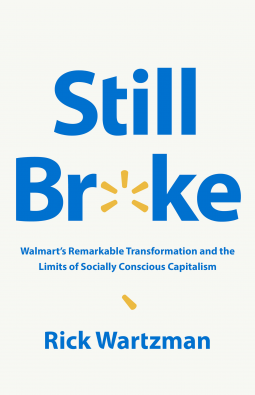
Still Broke
Walmart's Remarkable Transformation and the Limits of Socially Conscious Capitalism
by Rick Wartzman
This title was previously available on NetGalley and is now archived.
Buy on Amazon
Buy on BN.com
Buy on Bookshop.org
*This page contains affiliate links, so we may earn a small commission when you make a purchase through links on our site at no additional cost to you.
Send NetGalley books directly to your Kindle or Kindle app
1
To read on a Kindle or Kindle app, please add kindle@netgalley.com as an approved email address to receive files in your Amazon account. Click here for step-by-step instructions.
2
Also find your Kindle email address within your Amazon account, and enter it here.
Pub Date Nov 15 2022 | Archive Date Nov 14 2022
Description
How America’s biggest company began taking better care of its workers--and why such efforts will never be enough.
Fifteen years ago, Walmart was the most controversial company in America. By offering incredibly low prices, it had come to dominate the retail landscape. But with this dominance came a suite of ethical concerns. Walmart was accused of wiping out mom-and-pop businesses across the country; ruthlessly pressuring suppliers to cut costs, even if it meant closing up U.S. factories and moving production overseas; and, above all, not taking adequate care of its own employees, who were paid so little that many wound up on public assistance.
Today, while Walmart remains America's largest employer, the picture is very different. It has become an environmental leader among businesses, and has taken many other steps to use its immense scale to have a positive social impact. Most notably, its starting wage has risen from $7.25 to $12, and employee benefits have improved. With internal and external threats to its business looming, the company began to change directions in 2005—a transformation that accelerated in 2014, with the arrival of CEO Doug McMillon. By undertaking such large-scale change without a legal mandate to do so, Walmart has joined a number of major corporations that say they are dedicated to practicing a new, socially conscious form of capitalism.
In Still Broke, award-winning author Rick Wartzman goes inside the company's transformation, showing in novelistic detail how the company has gotten to where it is. Yet he also asks a critical question: is it enough? With a still-simmering public debate around the minimum wage and widespread movements by workers demanding better treatment, how far will $12 an hour go in today's economy? Or even $15? Or Walmart’s average wage, which now hovers above $17—but, even so, doesn’t pencil out to so much as $32,000 a year for a fulltime worker?
In the richest nation on earth, how did the bar get set so low? How did America find itself relying on an army of low-wage workers without ever acknowledging their most basic needs? And if Walmart's brand of change is the best we have, how can we ever expect to build a healthy society?
With unparalleled access to the key executives and change-makers at Walmart, Still Broke does more than document a remarkable business makeover. It interrogates the role of business in American life, and asks what the future of our economy and country can be—and whose job it is to make it.
Fifteen years ago, Walmart was the most controversial company in America. By offering incredibly low prices, it had come to dominate the retail landscape. But with this dominance came a suite of ethical concerns. Walmart was accused of wiping out mom-and-pop businesses across the country; ruthlessly pressuring suppliers to cut costs, even if it meant closing up U.S. factories and moving production overseas; and, above all, not taking adequate care of its own employees, who were paid so little that many wound up on public assistance.
Today, while Walmart remains America's largest employer, the picture is very different. It has become an environmental leader among businesses, and has taken many other steps to use its immense scale to have a positive social impact. Most notably, its starting wage has risen from $7.25 to $12, and employee benefits have improved. With internal and external threats to its business looming, the company began to change directions in 2005—a transformation that accelerated in 2014, with the arrival of CEO Doug McMillon. By undertaking such large-scale change without a legal mandate to do so, Walmart has joined a number of major corporations that say they are dedicated to practicing a new, socially conscious form of capitalism.
In Still Broke, award-winning author Rick Wartzman goes inside the company's transformation, showing in novelistic detail how the company has gotten to where it is. Yet he also asks a critical question: is it enough? With a still-simmering public debate around the minimum wage and widespread movements by workers demanding better treatment, how far will $12 an hour go in today's economy? Or even $15? Or Walmart’s average wage, which now hovers above $17—but, even so, doesn’t pencil out to so much as $32,000 a year for a fulltime worker?
In the richest nation on earth, how did the bar get set so low? How did America find itself relying on an army of low-wage workers without ever acknowledging their most basic needs? And if Walmart's brand of change is the best we have, how can we ever expect to build a healthy society?
With unparalleled access to the key executives and change-makers at Walmart, Still Broke does more than document a remarkable business makeover. It interrogates the role of business in American life, and asks what the future of our economy and country can be—and whose job it is to make it.
Available Editions
| EDITION | Other Format |
| ISBN | 9781541757998 |
| PRICE | $29.00 (USD) |
| PAGES | 272 |



